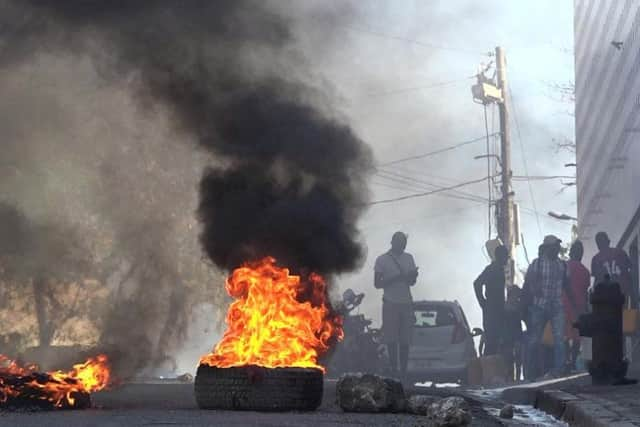Haiti: What is happening in Haiti, where state of emergency has been declared after armed gangs stormed major Port-au-Prince prison?
A state of emergency has been declared in Haiti, after armed gangs stormed two prisons and called for the resignation of prime minister Ariel Henry.
But what is happening in the Caribbean nation and why?


What happened over the weekend?
The gangs began their co-ordinated attacks on state institutions in Port-au-Prince on Saturday.
Advertisement
Hide AdAdvertisement
Hide AdTargets included police stations, the country’s international airport and even the national football stadium, where one employee was taken hostage for hours.
However, it was Saturday night when the assault on two prisons, including the National Penitentiary and another in nearby Croix des Bouquets, took place. Around 3,700 inmates escaped.
At least 12 people were killed in the violence. Three bodies with gunshot wounds lay at the prison entrance, while in another neighbourhood, the bloodied corpses of two men with their hands tied behind their backs lay face down as residents walked past roadblocks set up with burning tyres.
Why did gangs storm prisons and what are they trying to achieve?
It is estimated around 80 per cent of Haiti’s capital, Port-au-Prince, is controlled by criminal gangs.
The gangs, of which there are believed to be hundreds, are opposed to Mr Henry’s rule of Haiti. Violence has been rife in Haiti since 2001 and gangs have intensified their control of strategic areas increasing violence, including at the main fuel terminal in Port-au-Prince, and preventing the distribution of fuel.
In January, the UN said more than 8,400 people were victims of Haiti's gang violence last year, including killings, injuries and kidnappings – more than double the numbers seen in 2022.
Why did they want the prime minister to resign?
Since the weekend, the gang has called for the resignation of Mr Henry, who was abroad at the time the violence broke out, to try to salvage support for bringing in a United Nations-backed security force to stabilise the country in its conflict with increasingly powerful crime groups.
Gang leader Jimmy Chérizier, otherwise known as "Barbecue", announced a co-ordinated attack to remove him. "All of us, the armed groups in the provincial towns and the armed groups in the capital, are united," said the former police officer, who is thought to be behind several massacres in Port-au-Prince.
Advertisement
Hide AdAdvertisement
Hide AdMr Henry was due to stand down by February 7. However, elections were not held and he remains in post. He returned from Kenya on Monday afternoon. Gangs had previously said they would arrest him as soon as he arrived back in the country.
The government declared a state of emergency.
What is the political situation in Haiti?
Since the assassination of President Jovenel Moïse in July 2021, Mr Henry has led the government. However, he did so without a constitutional mandate, as he did not receive parliamentary approval.
In 2021, a group of cross-sector leaders known as the Commission for a Haitian Solution to the Crisis, joined by hundreds of civil society groups and political parties, produced and signed an accord that aimed to establish a new transitional government.
Mr Henry said he would hold general elections, but he did not appoint any members to the Provisional Electoral Council – the body tasked with organising elections – and it was dissolved a few weeks later.
Comments
Want to join the conversation? Please or to comment on this article.
